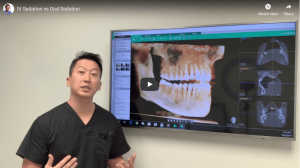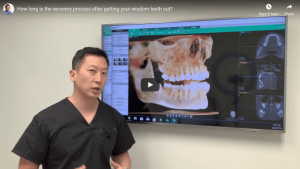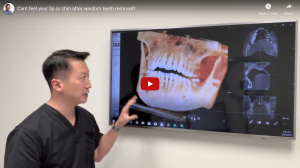Wisdom Teeth Removal Aftercare
Appropriate post operative care after wisdom teeth removal is an integral part of having a good overall experience with the procedure. I am going to discuss some important post op instructions and answer some commonly asked questions.
First of all, try not to eat or drink for a few hours after getting your wisdom teeth taken out. This will help make sure that you get some nice solid blood clots to form undisturbed over the sockets. This will help you avoid a complication called dry socket. Dry socket is basically when the blood clot becomes dislodged from your jaw, which basically results in dry exposed bone that is extremely painful. Think of it as the equivalent of a scab forming after scraping your knee. If you pick that scab off prematurely it will expose the cut and be very painful.
To reiterate, do not eat or drink for a few hours after getting your wisdom teeth extracted to prevent dry socket. Drinking water for medication is obviously okay as it is a small amount of liquid, so don’t worry about that. Another thing we tell our patients is do not use a straw for at least a week because that suction motion can cause the clot to become dislodged from your bone. Also, do not smoke. Smoking is horrendous for healing. The nicotine and chemicals from smoking or vaping can really cause issues with healing and tends to cause dry socket. Not only are we talking about patients that are smoking after the procedure, but even if you were smoking before heading into the procedure, you are way more likely at risk to experience dry socket. So again, do not smoke before or after the procedure.
In order to help that blood clot form quickly, do not spit excessively. Some patients tend to keep spitting because they taste blood in their mouth. It is normal to experience some bleeding but if you continue to spit, you are not allowing the blood clot to form. So do not spit excessively.
Also to avoid infections, do not eat food that are prone to get stuck in your sockets, like sesame seeds, jalapeno seeds, strawberries or other fruit with little seeds, and popcorn. Avoid these types of food for the next month because it could take that long for the sockets to close completely and if food gets caught in the socket, it could lead to pretty serious infections. I have seen patients over the years have some pretty gnarly infections and after performing a procedure called an incision and drainage, I have found popcorn kernels. I had a patient that had moved away to college and literally about a month after his extractions, had a severe infection. I prescribed antibiotics, which helped but when he came in for a post op visit I did a little exploratory procedure to see what actually caused that infection, and lo and behold, there was a huge jalapeno seed in there. So again, make sure you avoid foods that are hard to break down and that can get trapped in the socket and cause major infections.
After your procedure, you will be given a bag with plenty of gauze and an irrigation syringe. You must fill this irrigation syringe with liquid to flush out your sockets. We prescribed a bottle of chlorhexidine rinse, which is a blue colored antiseptic rinse. You draw it into the irrigation syringe and flush out the sockets to remove all the debris from food and whatever else might be caught in there.
I remember getting my wisdom teeth removed as a teenager, and being frustrated when food got caught down there. So again, this irrigation syringe will be your best friend in really getting all those materials out of your sockets. Make sure that you start using the irrigation syringe about four or five days after the procedure. We want to avoid dry socket so it is best not to disrupt the blood clot formation by irrigating too soon. So four to five days post op, irrigate after all your meals so that you keep the sockets clean and free of debris to lower the risk for infections and help you to heal faster.
Patients often ask me whether it is okay to brush back where their wisdom teeth were extracted. The answer is, absolutely. You want to keep that area clean so that you lessen your chance of infection. So you may brush normally but be ginger back there, be gentle. Don’t be gouging down into the sockets. Make sure that you brush gently back there. Again, you want to keep your teeth nice and clean.
Another thing that patients always ask me too, can they wear their retainer? Absolutely. You’re allowed to wear your retainer immediately after the procedure.
I also get a lot of questions about bleeding. Like I mentioned, your post op bag will have plenty of gauze and you will even be discharged with gauze inside your mouth. We never dismiss patients if they are still bleeding a lot. We will ensure that the blood is starting to clot and the bleeding is minimal before releasing a patient. Thus, you might still have some bleeding when you take the gauze out. When you go home, you will see some traces of the blood mixed in with saliva that will make the gauze look like it is saturated with blood. Do not be alarmed, as it really is not saturated in blood! Honestly, you are going to taste a little bit of blood that day. You are even going to taste blood the next day. Just because you see a little bit of blood on the gauze does not mean that you’re hemorrhaging blood, and you need to go to an emergency room or come in immediately. But if you have any concerns about bleeding afterwards, by all means, please call us. Please call the office, please call my cell phone which is the emergency phone number after hours. If you are concerned and need to come in and we can help address any potential bleeding that you may have.
In my nine years of practice, and again, having extracted over 10,000 cases of wisdom teeth, I have actually seen just one instance where a patient was bleeding excessively. That was a freak occurrence because that actually happened about 10 days after the procedure. So again, very, very, very, very, very low chance of experiencing bleeding like that.
If you do experience bleeding that is more than minimal, use the gauze in your post op bag, and apply a lot of force by biting down hard for at least 20 seconds. Your jaws are capable of producing a lot of force, so just make sure you bite really hard so that you can produce that force to clamp down on any bleeding and cause it to clot. So again, in the event of any excessive bleeding, please contact the office during regular hours, or call or text me after hours.
Medications. Following the procedure, you will receive several prescriptions. We prescribe antibiotics and we definitely always want you to finish those. We also give you ibuprofen or an alternative if you are unable to take ibuprofen. Use that every six hours to stay ahead of the pain. We also prescribe stronger pain medication in the event that you have any excessive pain and ibuprofen is not sufficient. We always prescribe that preemptively to make sure that you do not have any sudden pain later on if the ibuprofen is not enough. It is very important to make sure you finish your antibiotics.
Swelling. Everybody has different levels of swelling. We have seen patients who experience no swelling at all, and we have seen patients who have a significant amount of swelling. Every case is different and every individual will have a different experience in their healing. Luckily, whether or not you are prone to swelling is something that we can actually advise you of prior to your procedure. Because we have so much experience doing wisdom teeth extractions, we can actually look at your CT scan and tell you, based off your age, and your bone density, and the way that your wisdom teeth are coming in, how much swelling that you’re going to have. And if you are at risk for high amounts swelling, we can give you certain medications such as a Medrol Dosepak or steroids, to get them into your system before your wisdom teeth extraction, to help alleviate some of that swelling.
Post operatively, it is very important to ice your cheeks to help diminish swelling. We offer optional ice packs at our office that sit snugly within a head wrap so that you do not have to hold frozen peas or ice to your cheeks. Make sure to opt in and use the ice pack all day to limit that swelling.
Sleeping with your head elevated is really helpful to reduce swelling over the next few days. Swelling peaks at different times for everybody. Some people swell the most the next day, some people swell the most, the third or the fourth day. So do not be alarmed if you see quite a bit of swelling the third or fourth day. It is totally normal and it should start coming down after that.
Those are the main things to keep in mind but if you do have any further questions, make sure that you give us a call during regular office hours. And if you have any concerns and our office is closed, please feel free to text or call that emergency contact number that I provided you on the day of surgery. Typically texting is the best way to get a quick response on that emergency number. Thanks!
Conclusion
Post-Op Tips in Summary:
- Avoid eating or drinking for a few hours after procedure
- Don’t use a straw for a week
- Absolutely no smoking!
- Do not spit excessively
- Avoid foods that can easily get stuck like sesame seeds, etc.
- Use the irrigation syringe to flush out the sockets
- Yes, brush your teeth back there, just be gentle
- If you have a retainer, you may wear it.
- Use medications as prescribed
- Ice your cheeks to reduce swelling




